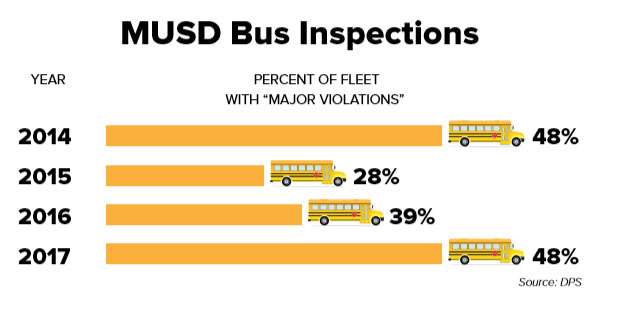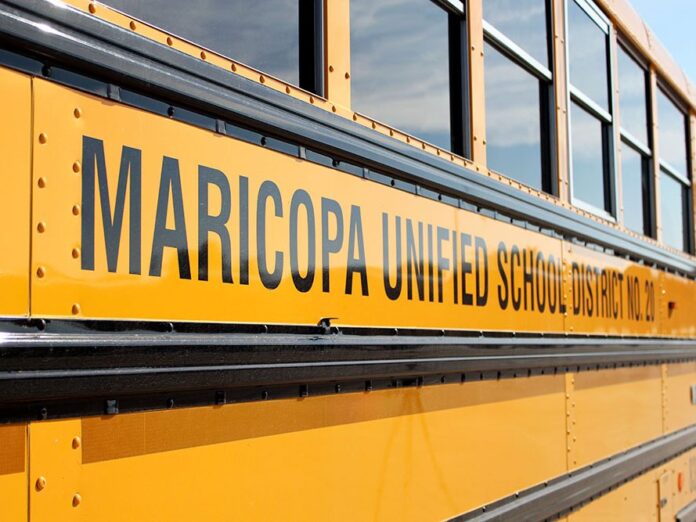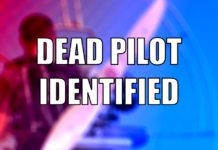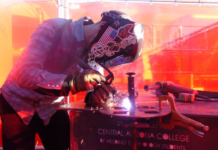By Michelle Chance
Around 8,000 school buses are inspected by the Arizona Department of Public Safety every year. Inspectors discover minor and sometimes major defects.
In 2017, nearly half of Maricopa Unified School District’s fleet had major violations, according to DPS documents and the Arizona Administrative Code.
Capt. Brian Preston, who oversees commercial vehicle enforcement with DPS, said if school district transportation departments cannot repair the defect while the inspector is on-scene, the bus is not allowed on the road.
What is considered a major defect is wide-ranging, however, from quick fixes like decals for emergency exits to mechanically intensive repairs of the suspension or engine.
“There are things that will shut a bus down that will not shut your personal car down,” Preston said, adding school buses are held to a higher safety standard.
But between 2014-17, many of the violations included defects such as inoperative brakes, exit doors, lamps and alarms – and defects in tires, seats and suspensions.
2017 a difficult year in the bus barn
Last year’s inspection of MUSD’s 37 buses included 17 that qualified for out-of-service violations, eight buses with no violations and 12 marked with minor violations.
Preston said the state average for out-of-service school buses at any given district fleet is 30 to 35 percent. Last year, 48 percent of MUSD’s fleet was tagged with major defects.
“Obviously, that’s higher than what we generally have as a state average,” Preston said.
MUSD Transportation Department Director Sergio Pulido said staff shortage was partly to blame. Two shop mechanics were out with major surgeries for a period of time, leaving one mechanic in the garage to handle regular maintenance of the fleet.
Pulido and former Director Fred Laguna also pitched in at the garage while they prepared for a change in leadership.
“I had to do my job, and then I was learning to do his job because he was retiring,” Pulido said.
2017 was a year of transition for the transportation department that has for years dealt with an industry accustomed to a shortage of school bus driving staff.
This school year, Pulido’s two mechanics have returned to the garage.
MUSD Human Resources Director Tom Beckett said the department also hired a shop foreman. Pulido believes the additional mechanical muscle at the bus barn will lead to better inspections.
Newer equipment would help too, Pulido said.
Aging fleet
The average age of an MUSD bus is 10 to 15 years old. The oldest, No. 36, was made in 2001.
But persuading district administration to replace an entire fleet is difficult given MUSD may have to build additional school sites to support growing enrollment, among other expenses.
The district typically purchases one used bus per year. In March, the transportation department received a large, 84-passenger bus. Pulido said one bus a year is not enough.
“It’s frustrating because you want to run a good fleet, you want your people to stay and you want to make your people happy,” Pulido said.
Last year’s violations are not new to the district. According to DPS documents, MUSD’s aging fleet received major violations above the state average in 2016 (39 percent) and 2014 (48 percent). MUSD was below the mark in 2015 with 28 percent.
Those data don’t mean nearly half of the fleet was taken off the road.
 Quick repairs
Quick repairs
DPS inspection reports indicate much of the major defects were repaired during inspections. A DPS trooper typically spends two to three days inspecting a fleet.
Troopers tag buses that have passed inspection with a sticker displaying the current year.
Buses are usually shut-down when the transportation department is short the parts needed to make the repair during inspection, Pulido said.
In that case, Pulido said the department consolidates and reassigns routes to other buses until the repair is made and a re-inspection can be scheduled with DPS. Combined routes often mean up to a 30-minute wait for school children – and myriad complaints from parents.
Pulido said he does not put an out-of-service bus on the road, even if the proper repairs have been made prior to re-inspection.
“The safety of the students, the safety of the driver and the liability of the district – you don’t ever want to put that in jeopardy,” Pulido said.
School administrators and employees who violate state statute concerning school buses are “guilty of misconduct and subject to removal from office or employment.” To enforce such misconduct, an informed person would need to report the allegation.
“DPS would investigate, contact the district, and the district would comply,” Preston said.
Preston said DPS has received reports that other districts allegedly operate buses that have failed inspection, but investigations rarely lead to disciplinary action because district administrators said they were unaware, or it was simply a mistake.
“In the past we prepared for these kind of things: cease-and-desist orders and potential for whatever type of sanction that could come, but it’s never come to that point,” Preston said.
MUSD’s next round of inspections is expected this fall.
This story appears in the April issue of InMaricopa.

















